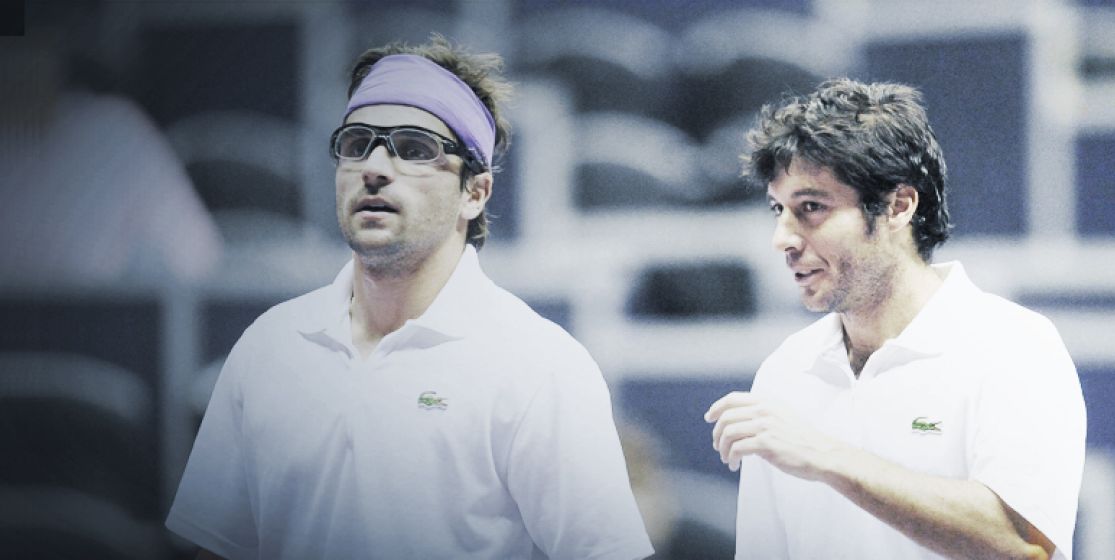By spending their time living together, inevitably tennis players start hanging out and some even become "BFF". But when fate decides to confront them, what happens in their head? We sought out the answer...
Of the four Grand Slam semi-finals he played (and lost them all), Sebastien Grosjean may regret one in particular: his defeat against Arnaud Clement at the 2001 Australian Open. If he can still find consolation in knowing that it was his friend who had the chance to face Andre Agassi in the final two days later, the Marseille-born player may also wonder whether it's wasn’t his close relationship his opponent that made him waver. Leading two sets to love and a break ahead in the third set, Grosjean melted and lost his aggressiveness when it came to killing the match off, to the point of letting his friend get back into the game and steal the match in five sets. As if their friendship had paralyzed him. He can rest assured: he's not alone. “Playing an official match against a very good friend isn’t difficult; it's almost impossible. I hate it. It happened to me a few times, and I've almost never managed to put the emotional aspect to one side. I have played almost only pathetic matches” remembers Julien Boutter, a tour pro until 2004. Good friends with Thierry Ascione and Olivier Mutis, the current director of the Moselle Open nevertheless noted that it's not the case for everyone: "For Olivier Mutis, it's the opposite: he's rarely motivated, but when he plays against a friend, out of respect, he works hard and plays well. He beat me twice." With Ascione, also godfather to his son, Boutter used to share everything: dinners, hotel rooms, workouts. Suffice to say that when fate put them together on a court, it was far from fun: "We could play unbelivably well during training in the morning of the match then play really badly on the court two hours later. Before a match, during the protocol, it is customary to wish ‘good match’ to your opponent. With Thierry, it was more ‘good luck » says Boutter.
Establish rules of good conduct
The laws of tennis being immutable - a game always needs a winner and a loser - it is better to deal with this kind of duel with the sole purpose of winning. But how do you make an abstraction of your enemy? "The way to approach a game against a friend doesn’t radically change. We focus on the goal, which is to win, but we also can spend the previous evening together. In contrast, we establish some rules of good conduct. For example, on any potentially contentious points, we decide not make any appeals and strictly comply with the decisions of the referee to avoid any misunderstanding after the match such as ‘You should have proposed to replay this ball’ " says Florent Serra, whose links with Gilles Simon, Marc Gicquel or Nicolas Mahut go beyond the world of the yellow ball. To avoid all kind of arguments, other self-imposed rules forbid too demonstrative celebrations. "Against Josselin, for example, I'm not going to look at him overjoyed after a nice shot, or yell ‘C’mon!’. After each point I’ve won. There is more reserve than when I play against a stranger" says David Guez, friends with the young Ouanna. After the match? "We don't talk about it. We talk about something else. Our stories, our girlfriends" he continues. Finally, if playing against a friend is mentally delicate, it can be a boon from a technical tactics perspective: "After training together a lot, we know the strengths and weaknesses of the friend on the other side of the court. And thus the tactics to adopt" said Florent Serra. But be careful not to be mistaken: all players could do without this kind of match, as suggested by David Guez: "Subconsciously, you know that one of the two will lose and will have to leave the tournament. And therefore, if you win, the end of the week is going to be long and lonely”
Par Marc Hervez






